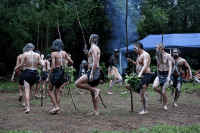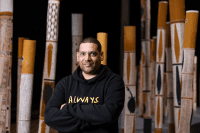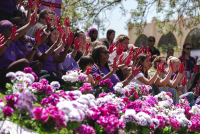A song from the perspective of an Indigenous warrior observing the arrival of Captain James Cook has sparked controversy on a conservative radio show after it was revealed that it had been played at a public school in Sydney. Indigenous Warrior Song Sparks Controversy in Sydney School
Bagi-La-M Bargan, meaning “fighting boomerang” in Butchulla, is a song by musician Birdz, also known as Nathan Bird, a proud Murri man with Badtjala, Juru, Scottish, and Melanesian heritage. The song, released in 2020 alongside Birdz’s cousin Fred Leone, a Butchulla man, depicts a young man on Indian Head on K’gari (Fraser Island), witnessing Captain Cook’s 1770 expedition along Australia’s east coast. The music video includes images of protests, traditional Aboriginal dances, and the Aboriginal flag.

The song, which includes the lyrics, “any white devil wanna test my will, then he finna get burnt by the fire I feel,” was played at Ramsgate Public School in Sydney, causing one parent to complain to Ben Fordham’s show on 2GB. The parent argued that the lyrics promoted hatred and expressed concern over his child questioning if there was any problem with being white.
“The nature of the song…doesn’t provide reconciliation, it doesn’t provide inclusion,” he said, with the radio station later labeling the song “offensive.”
The legacy of Captain Cook has been a contentious issue for decades, often involved in protests surrounding Indigenous sovereignty and the impact of colonization. Cook was killed in 1779 in Hawaiʻi after a dispute with Indigenous Hawaiians. Recently, multiple statues of Cook have been desecrated across Australia, reflecting ongoing tensions.
Birdz’s song touches on Cook’s legacy with lines like, “Patiently waiting for someone I ain’t never seen before. They say he’s a captain of men, but he don’t believe in our lore. From the land of the white skin. He’s self-righteous, a murder without licence.”
Before the song’s release, Birdz explained its inspiration: “The dominant narratives of Australian history neglect the fact that there was an active Aboriginal resistance against European invasion. The song is inspired by this resistance and the fighting spirit that we continue to carry with us today. Always was, always will be.”
Education Minister Pru Carr called into the radio show and expressed her concern, stating that the song was not appropriate for primary school students. “I’ve been really consistent that schools are not places for things like that. Anything that creates any sort of division we can’t have in our schools,” she said. “Reading the lyrics, and listening to it, I can understand why parents are concerned.”
A NSW Department of Education spokesperson apologized for any distress caused to parents or children at Ramsgate Public School, noting the song was intended to mark Reconciliation Week and not to be divisive. They added that the school’s leadership had been advised to make appropriate choices for school bell songs. It is understood that no parent initially raised concerns with the principal or the school about the song, which has since been removed from the school’s playlist.
The incident highlights ongoing debates over how Australian history is taught and represented in schools, especially regarding the perspectives and experiences of Indigenous Australians.
The National Indigenous Cultural Centre (NICC) is an Indigenous home.
We provide Indigenous products, music, art and news.
If you want Indigenous gifts and merchandise, bush tucker food at your next event or Indigenous entertainment at your next party, expo or conference, feel free to contact us!
Visit our page: https://nicc.org.au/
Tony Clemenger.
Chief Executive Officer.
Tel: 0419431649.
Level 1 397 Chapel Street South Yarra 3141.








